Mark Zuckerberg and the Influence of Media

"I started building social media to give people a voice," Mark Zuckerberg proclaimed, notably wearing a $900,000 wristwatch during his statement.
Changes in Policy and Reactions
The cessation of fact-checking at Meta has garnered significant attention. Equally critical are the alterations to its hateful speech policy. These changes permit derogatory language towards transgender individuals, allow claims that women are property, and suggest homosexuality is a mental illness. Unsurprisingly, these policy shifts have sparked outrage among LGBTQ employees at Meta. Furthermore, the "more personalized approach to political content" seemingly reintroduces polarization to users.
Zuckerberg’s Revisionist Narrative
Zuckerberg’s announcement is being perceived as a strategic ploy related to the incoming political climate, notably with its presentation on Fox and Friends. Observers noted the narrative he attempted to craft, implying that past policies were reactions to pressure from governments and media, when, in fact, these were decisions under his own control. It is well-documented that Zuckerberg maintains significant influence over Meta’s direction.
Blame Game Continues
In his latest announcement, Zuckerberg pointed fingers at external pressures, stating, "Governments and legacy media have pushed to censor more and more." He further added that post-2016 election criticisms about misinformation came from "legacy media" who expressed ongoing concerns over democratic impacts, stating his belief that the fact-checkers, being politically biased, eroded trust.
The Reality of Governmental Influence
The notion that the U.S. government has significantly influenced Meta’s fact-checking policies is unfounded. While fines and settlements have been issued, these are minor inconveniences for a company the size of Meta. An ongoing FTC antitrust case remains unrelated to censorship or fact-checking policies.